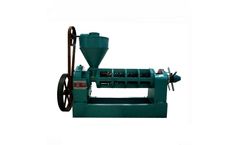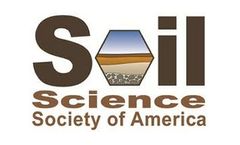Soybean Rust Induced Yield Articles & Analysis: Older
36 articles found
Agriculture degrades over 24 million acres of fertile soil every year, raising concerns about meeting the rising global demand for food. But a simple farming practice born from the 1930's Dust Bowl could provide a solution, according to new Stanford research. The study, published Dec. 6 in Environmental Research Letters, shows that Midwest farmers who reduced how much they overturned the soil -- ...
Cottonseed oil expeller machine is mainly composed of electrical control, automatic heating, adjustment, transmission, and vacuum oil filter. The screw is carburized by alloy steel to enhance surface hardness and wear resistance. The platter is ground by the surface grinding machine to ensure the finishing coat and increase the oil output. The surface of the machine is treated with stainless ...
Most farmers are familiar with contests in which participants try to achieve the maximum yield of a crop from a given field. Fewer would be familiar with a contest in which participants’ total crop yield is divided by the amount of water they use—thus measuring their water use efficiency. That’s the kind of contest that Dr. Chris Henry and his colleagues at the University of ...
On, March 12, 2019, USDA’s Animal and Plant Health Inspection Service (APHIS) announced the publication of two draft documents related to the potential deregulation of a soybean variety GE for increased yield and resistance to the herbicide glufosinate. The draft documents are Draft Plant Pest Risk Assessment (PPRA) and Draft Environmental Assessment (dEA) for Petition to Deregulate GE ...
Indigo announced yield forecasts in January for corn and soybeans across the Americas, democratizing data for the grower community to better navigate global markets during the U.S. government shutdown. With the shutdown, the doors of the United States Department of Agriculture (USDA) had closed. No work in that department meant that there was an indefinite hold on a key report, known as the World ...
Researchers around the world are exploring how GMO technology might boost food production under hot, dry conditions. Roger Deal is trying to figure out how plants remember drought. An assistant professor of biochemistry and genetics at Emory University, Deal says most plants have a kind of memory for stress. When experiencing water shortage, for example, plants close the holes in their leaves, ...
ByEnsia
As the 2013 corn crop was being planted, futures prices were above $6.00 a bushel with an occasional bump above $7.00. Traders were concerned that the planting problems farmers were experiencing would result in reduced production. By the end of July, with fewer concerns about the size of the corn crop, the priced dropped below $5.00. Since then the price has trended downward so that as this ...
In the Huaibei Plain basin, China, soybean is a main crop. During the soybean growth period, rainfall can vary largely and depth to watertable can also vary largely. The amount of water supplied to the soybean rootzone by groundwater affects soybean growth and yield. Accurate simulation of groundwater contributions to soybean rootzone soil moisture (groundwater contribution) can be important ...
This paper provides an assessment of the economic impact at the farm level of agricultural biotechnology on global agriculture. It examines the economic impacts on yields, key costs of production, direct farm income, indirect (non-pecuniary) farm level income effects and impacts on the production base of the four main crops of soybeans, corn, cotton and canola. The analysis shows that there have ...
Genetic gain for new soybean [Glycine max (L.) Merr.] cultivars is substantial, and research suggests this is partially explained by greater tolerance to increased plant densities. We conducted an experiment to determine if greater tolerance to increased plant density and more efficient use of cumulative intercepted photosynthetically active radiation (CIPAR) partially explained the yield ...
Soybean [Glycine max (L.) Merr.] grown on high pH, calcareous soils often suffer yield loss due to unavailability of Fe. Further yield decline can occur due to infestations by soybean cyst nematodes (Heterodera glycines Ichinohe; SCN) that are often present in greater numbers in high-pH soils. An observational study was conducted from 2001 to 2005 in Iowa to examine the relationships among: pH; ...
Stage-specific economic injury levels (EILs) form the basis of integrated pest management for soybean aphid (Aphis glycines Matsumura) in soybean [Glycine max (L.) Merr.]. Experimental objectives were to develop a procedure for calculating EILs of the soybean aphid specific to the R2 (full bloom), R4 (full pod), and R5 (beginning seed) soybean development stages using the law of the diminishing ...
The soybean aphid (Aphis glycines Matsumura) is a new invasive soybean [Glycine max (L.) Merr.] insect pest first identified in North America in 2000. A major aphid resistance gene Rag1 was identified and mapped from the maturity group VIII cultivar Dowling, and the gene has been introgressed into Midwest-adapted germplasm. The objective of this study was to test the associated effects of Rag1 on ...
Soybean [Glycine max (L.) Merr.] grown on high pH, calcareous soils often suffer yield loss due to unavailability of Fe. Further yield decline can occur due to infestations by soybean cyst nematodes (Heterodera glycines Ichinohe; SCN) that are often present in greater numbers in high-pH soils. An observational study was conducted from 2001 to 2005 in Iowa to examine the relationships among: pH; ...
Stage-specific economic injury levels (EILs) form the basis of integrated pest management for soybean aphid (Aphis glycines Matsumura) in soybean [Glycine max (L.) Merr.]. Experimental objectives were to develop a procedure for calculating EILs of the soybean aphid specific to the R2 (full bloom), R4 (full pod), and R5 (beginning seed) soybean development stages using the law of the diminishing ...
Soybean [Glycine max (L.) Merr.] yield formation in field environments can be either source-limited or sink-limited, depending on the assimilatory capacity of the mother plant relative to the assimilate demands of the developing seeds. Our objective was to evaluate yield and seed quality relationships under source-limited and sink-limited conditions during the seed-filling period, as protein and ...
In high-yielding soybean [Glycine max (L.) Merr.] environments, N uptake during seed-filling may be constrained when the late-season decline in biological nitrogen fixation (BNF) is coupled with insufficient soil N. Three N-fertilization strategies were compared with a control (N0) on soybeans in 2006 and 2007 in a high-yield soybean-maize (Zea mays L.) rotation experiment established in 1999. ...
This study investigated long-term agronomic management systems and precipitation level effects on soybean [Glycine max (L.) Merr.] total oil content and fatty acid composition. Management systems evaluated included conventional (CT), no-till (NT), low chemical input (LI), and zero chemical input (ORG). Total oil content and major fatty acids profiles were analyzed by accelerated solvent extractor ...
Current demand for soybean grain [Glycine max (L.) Merrill] may lead to a conversion of pasture and Conservation Reserve Program fields into soybean or corn (Zea mays L.) production. Our objective was to determine the effect of soybean seed inoculation with Bradyrhizobium spp. and fertilizer N application rate on soybean productivity planted 1 and 2 yr after conversion to row crop production. ...
Planting date is a critical aspect of all soybean [Glycine max (L.) Merr.] production systems, but the response of yield to planting date fluctuates widely among environments. A combined analysis of many planting date experiments will provide a better estimate of the average response. Data from 28 nonirrigated planting date experiments that were conducted for more than 1 yr with at least three ...










